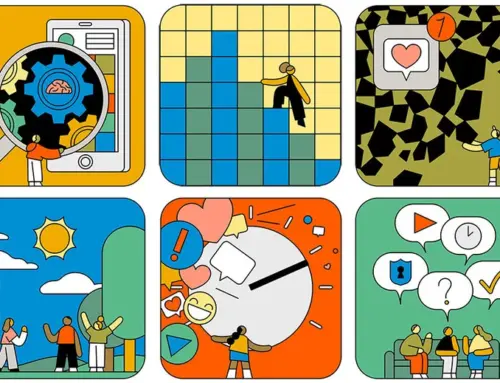Breaking Free from the Binge Eating Cycle
The cycle of binge eating disorder (BED) can be exhausting. You can go days or even weeks without an episode of binging. Then, out of nowhere, you’re back in the cycle of eating to excess while feeling out of control. Afterward, you are overcome by feelings of guilt, shame, and regret.
If this sounds like you, you’re not alone. BED affects an estimated 2.8 million adults in the United States, and it’s the most common eating disorder today. The disorder involves episodes of overeating paired with a loss of control. They occur at least once a week for at least three months. BED affects men and women, and people of all ages, races, and income levels.
If you have BED and are feeling stuck, here are 10 things you can do to break the cycle and get back to a healthier relationship with food.
1. Plan Regular Meals and Snacks
Getting yourself back to a regular eating pattern can be a great first step to overcoming the binging cycle, according to Beth Brandenburg, MD, associate medical director for the Center for the Treatment of Eating Disorders at Children’s Hospitals and Clinics of Minnesota.
What does a regular eating pattern look like? Try fitting in three meals and two or three snacks into every day. If that means scheduling it on your to-do list, do that. Try to go no more than three to four hours between meals. Consistently putting food into your system can reduce the urges to binge eat that come from extreme hunger.
2. Look for Binge Eating Triggers
Once you’ve had some success getting regular meals back into your day, you can start looking for what triggers your cycles of binge eating. Knowing more about what prompts you to overeat can help immensely you manage triggers.
Try keeping a journal and document how you feel before and after each meal or snack. Make note of times when you binged or times when you ate without being hungry. Were you feeling certain emotions? Were there environmental triggers, like being in a certain social setting or walking by that candy jar at work? Noting your eating patterns and the events and feelings associated with them can help you find your triggers.
3. Find Alternatives for Binge Eating Trigger Situations
Knowing what might make it more likely for you to slide into your cycle of binge eating can also help you manage those situations, according to Brandenburg. If one of your unhealthy habits includes binging while watching your favorite nightly TV shows, you can plan around that to give yourself the best chance for success.
This might mean going out for a walk or watering the garden instead of watching TV. Or it might mean watching TV while doing something else to distract you from eating, such as walking on the treadmill or knitting.
4. Stop Labeling Foods ‘Good’ and ‘Bad’
Seeing yourself as a failure for eating a “bad” food will not help you get to a healthier place. This can increase feelings of guilt, which can actually make you more likely to binge.
5. Trash the Diet Books
Does that airbrushed model on the cover of your monthly fitness magazine bring on negative thoughts about your body? Do the diet books in your home remind you of failed attempts at eating healthier? If so, toss them. Rid your house of any books or magazines that make you feel inadequate.
Diet books and materials can also lead you back to unhealthy behaviors because they cause you to judge yourself on likely unattainable ideals.
6. Make Self-Care a Priority
Self-care is about more than maintaining a healthy, nutritious diet. This also includes the way you talk and think about yourself and your body. Be kind to yourself. Recovery is not a straight line, according to Dana Magee, RD, LD, CLT, a registered dietitian and coauthor of the workbook “Taste the Sweet Rebellion: Rebel Against Dieting.”
“It is important to know that your life does not have to revolve around food and weight and that you can have and deserve to have a life free from food struggles,” says Magee.
7. Seek Help to Break Cycles of Binge Eating
If you haven’t yet, you should seek care from a healthcare team with experience in treating eating disorders. Seeking help is the greatest step you can take for long-term recovery.
If you don’t know where to find a binge eating disorder expert, ask your primary care doctor or your insurance provider for a recommendation.
8. Find the Right Binge Eating Disorder Treatment for You
There are multiple types of therapies that can help with binge eating disorder treatment. Cognitive behavioral therapy seeks to help you:
- establish regular eating patterns
- find alternatives to binge eating
- change the way you think about your body, weight, and shape
Interpersonal psychotherapy and dialectical behavior therapy are other therapies that may be used for the treatment of BED. There is evidence to support both of these treatments for BED.
Nutritional supplements and medication for other conditions you have can also aid treatment, says James M. Greenblatt M.D, chief medical officer and vice president of medical services at Walden Behavioral Care in Waltham, Massachusetts.
9. Work with a Healthcare Team You Trust
There is no one binge eating disorder treatment plan, so it’s crucial to find a healthcare professional, whether that’s a psychiatrist or other expert in eating disorders, whom you trust.
“The most effective approach is one that integrates psychotherapy and nutritional therapies, along with medications, and other lifestyle changes as needed,” says Greenblatt.
10. Recognize the Binge Eating Cycle
Above all, be honest with yourself. Recognizing that you have a problem and speaking up about it is the most important step you can take.
Learn more about our virtual Free to Be intensive outpatient program for adults who struggle with binge eating disorder, emotional eating, compulsive eating, and food addiction. This virtual treatment program is flexible, offering both daytime and evening programming, so get started on your path to recovery today.
Reach Out for Help Overcoming Binge Eating Disorder
We know finding care can be tough. That’s why Walden is here for you. If you are concerned that you, or a loved one, may have bulimia, please reach out by completing the form on this page or email us at intake_coordinators@waldenbehavioralcare.com.






